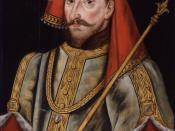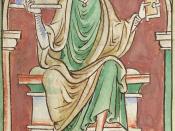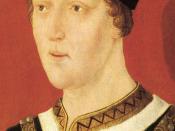Henry IV's lecture to Hal in 3.2 provides the audience with much more than an example
of Henry's relationship with his son. It also serves as an examination of the kingship and its
changing role. Henry's attempts to criticize Hal inadvertently draw many parallels between him;
his son, and his predecessor, Richard II, and while he intends to reveal Hal's shortcomings, he
primarily reveals his own.
He begins by criticizing Hal's choice of associates, namely the rogues who inhabit the
tavern. He claims that if he had been close friends with such people, Richard would still be King
of England. In fact, he blames Richard's poor choices of advisors for his downfall. By flattering
Richard for their own ends, instead of letting him know the true state of affairs in England, they
kept him oblivious to the growing dissatisfaction of the populace.
With shallow jesters and rash bavin wits,
Soon kindled and soon burnt; carded his state;
Mingled his royalty with cap'ring fools;
Had his great name profanShd with their scorns
And gave his countenance, against his name,
To laugh at gibing boys and stand the push
Of every beardless vain comparative (3.2.61-67);
While Falstaff and his companions may be 'vulgar company' (3.2.41), however, they are, in fact,
exactly the type of company with which Henry was associated by Richard, who greatly feared
Henry's 'courtship to the common people' (Richard II, 1.4.24). Rather than avoiding people like
Falstaff, he sought them out and won their hearts. This disparity serves to undermine Henry's
argument that Hal should separate himself from the common people as much as possible.
The contradiction between Henry's elevation to the throne by public opinion and his
suggestion that Hal avoid becoming involved with the lower classes can be interpreted in a
number of ways.


